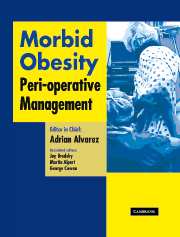Book contents
- Frontmatter
- Contents
- Contributors
- Foreword
- Preface
- Acknowledgments
- Dedication
- Section 1 General aspects
- Section 2 Pathophysiology
- Section 3 Pre-operative management
- 9 Pre-operative evaluation of the patient for bariatric surgery
- Section 4 Peri-operative management of co-morbidities
- Section 5 Pharmacology
- Section 6 Monitoring
- Section 7 Intra-operative management
- Section 8 Post-operative care
- Section 9 Conclusions
- Afterword
- Index
9 - Pre-operative evaluation of the patient for bariatric surgery
from Section 3 - Pre-operative management
Published online by Cambridge University Press: 17 August 2009
- Frontmatter
- Contents
- Contributors
- Foreword
- Preface
- Acknowledgments
- Dedication
- Section 1 General aspects
- Section 2 Pathophysiology
- Section 3 Pre-operative management
- 9 Pre-operative evaluation of the patient for bariatric surgery
- Section 4 Peri-operative management of co-morbidities
- Section 5 Pharmacology
- Section 6 Monitoring
- Section 7 Intra-operative management
- Section 8 Post-operative care
- Section 9 Conclusions
- Afterword
- Index
Summary
Overview
No randomized controlled trials give irrefutable evidence that pre-operative evaluation of the obese patient, even before bariatric surgery, makes a significant difference to patient mortality. But much evidence indicates that such evaluations, like for other patients, makes the peri-operative period more efficient, reduces provider and patient anxiety, sets appropriate expectations that lead to increased patient satisfaction with pain therapy and with the entire peri-operative experience. We believe such an assessment can also spot important variations in airway, pulmonary, cardiovascular, metabolic and nervous system physiology that lead to improved provider preparedness and patient outcome, and the feeling of both about the quality of the peri-operative care. Such may be an important part of surgery in the obese and especially bariatric surgery (see Chapter 1). And motivating and ensuring prophylaxis for deep vein thrombosis can be an important determinant for acute outcome, as pulmonary emboli are the greatest cause of adverse peri-operative 30 day mortality. Importantly, any contribution the anesthesiologist can make toward evaluating psychologic attitude and preparation of the patient (for example, “the patient stopped exercising 3 weeks ago”) is usually most welcomed and important to the surgeon. For it is the psychologic readiness of each patient and that patient's commitment to outcome after this operation that appears to determine its long-term worth for that patient.
- Type
- Chapter
- Information
- Morbid ObesityPeri-Operative Management, pp. 113 - 128Publisher: Cambridge University PressPrint publication year: 2004



